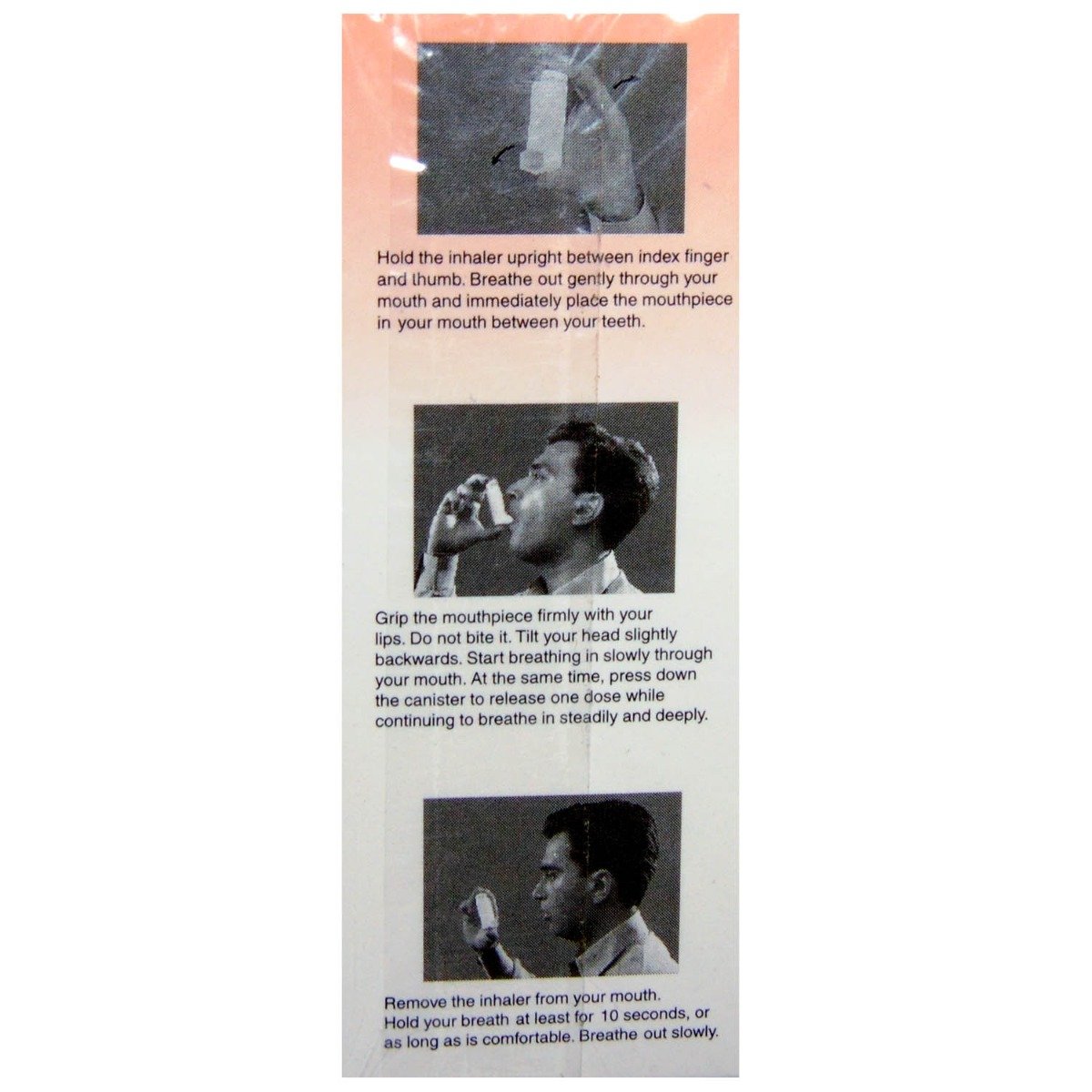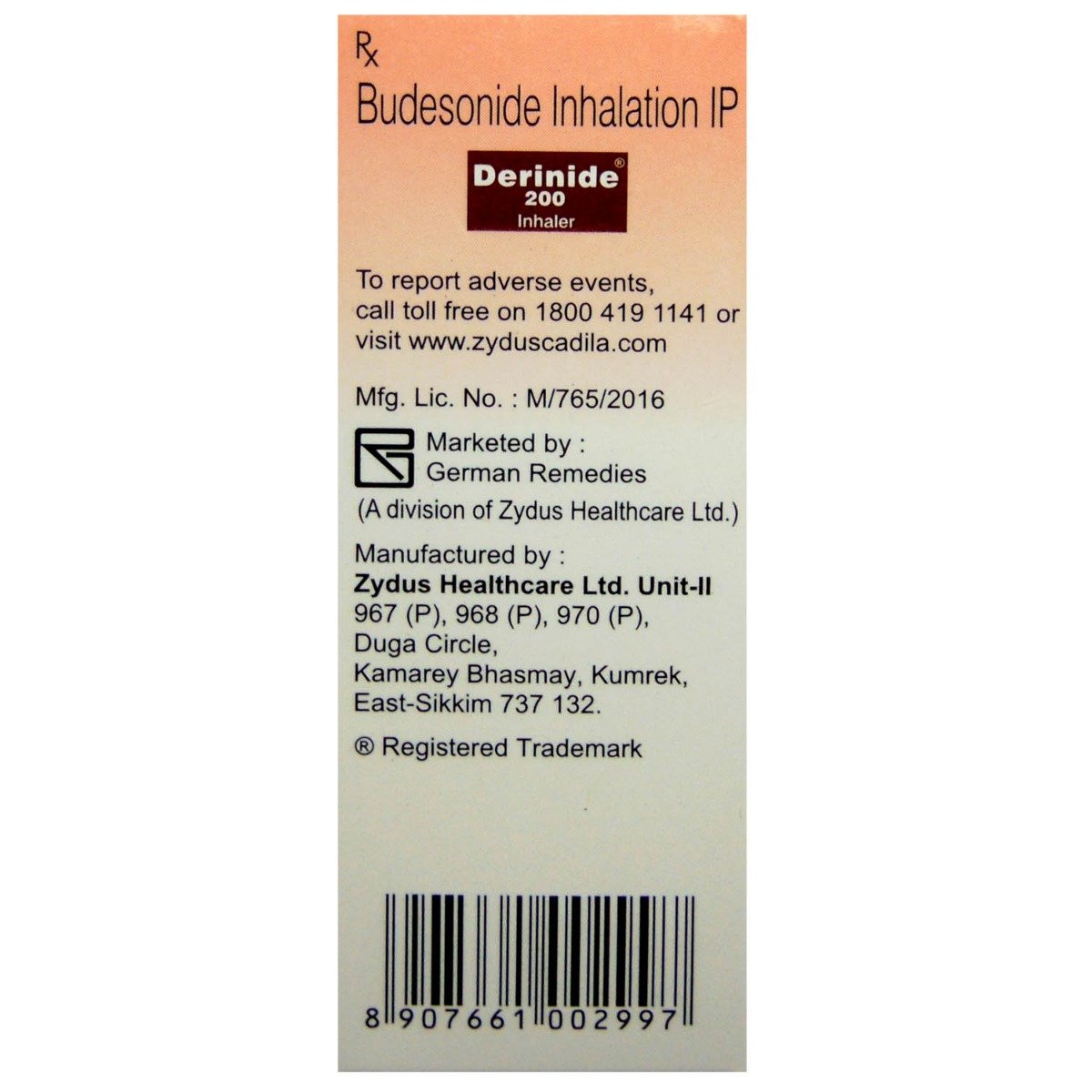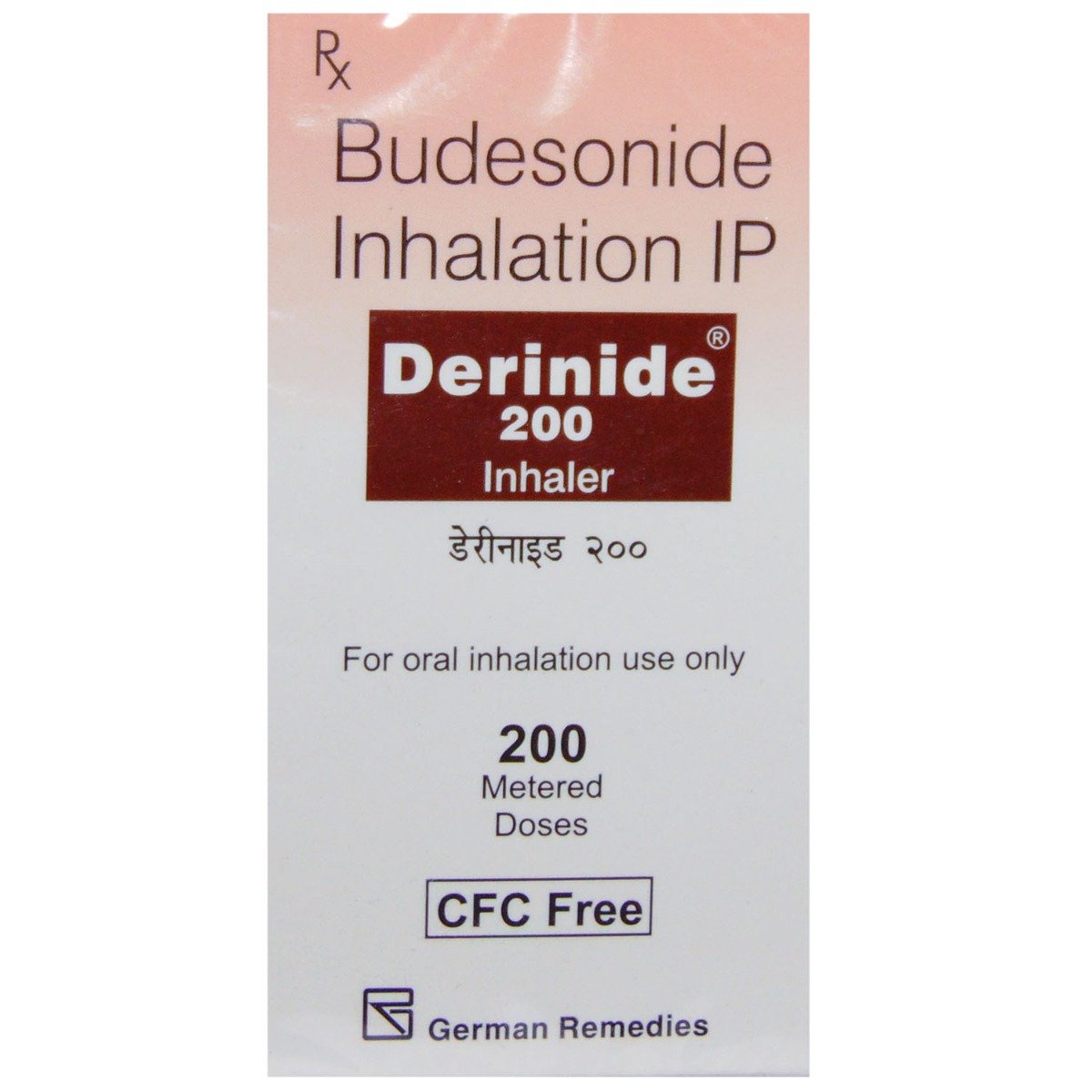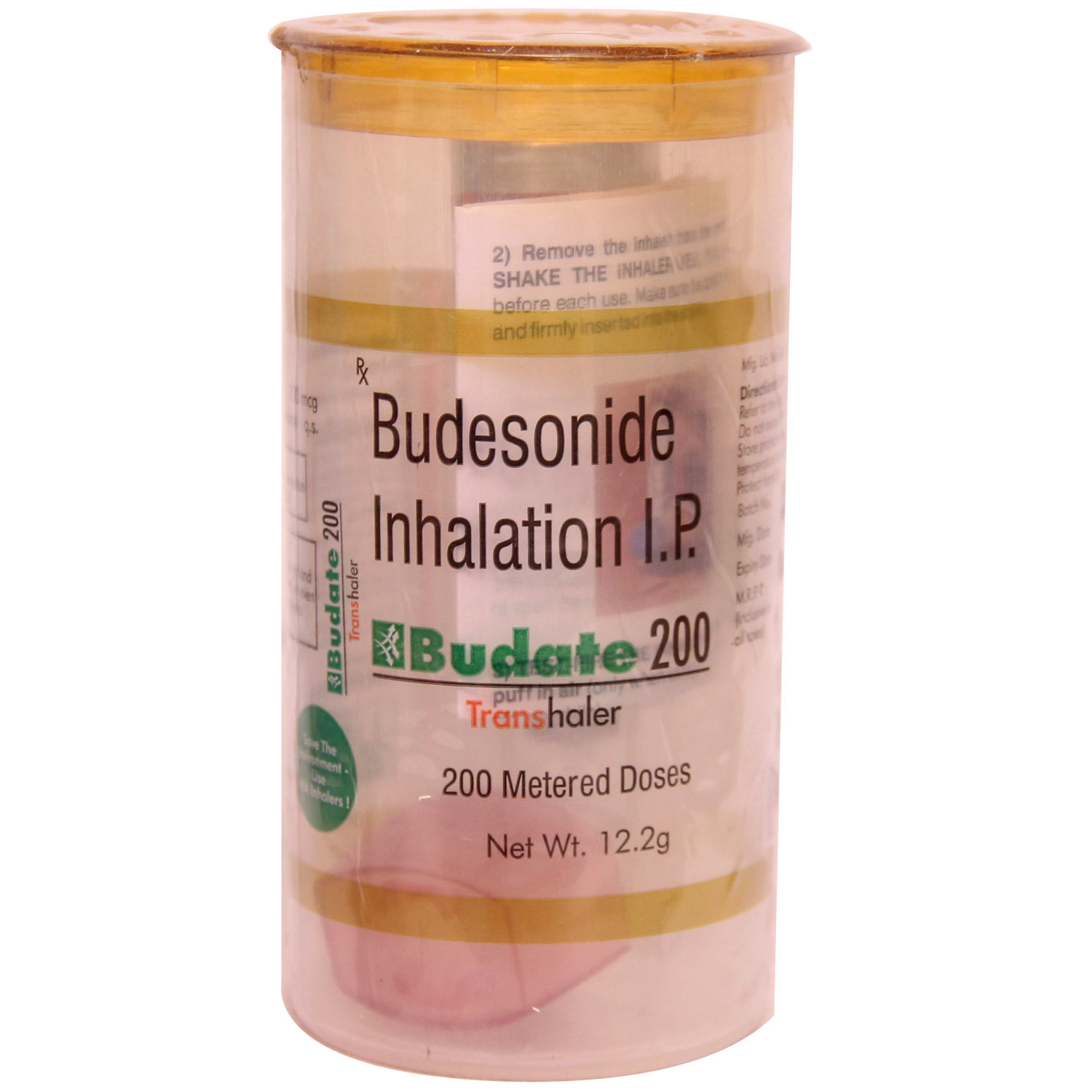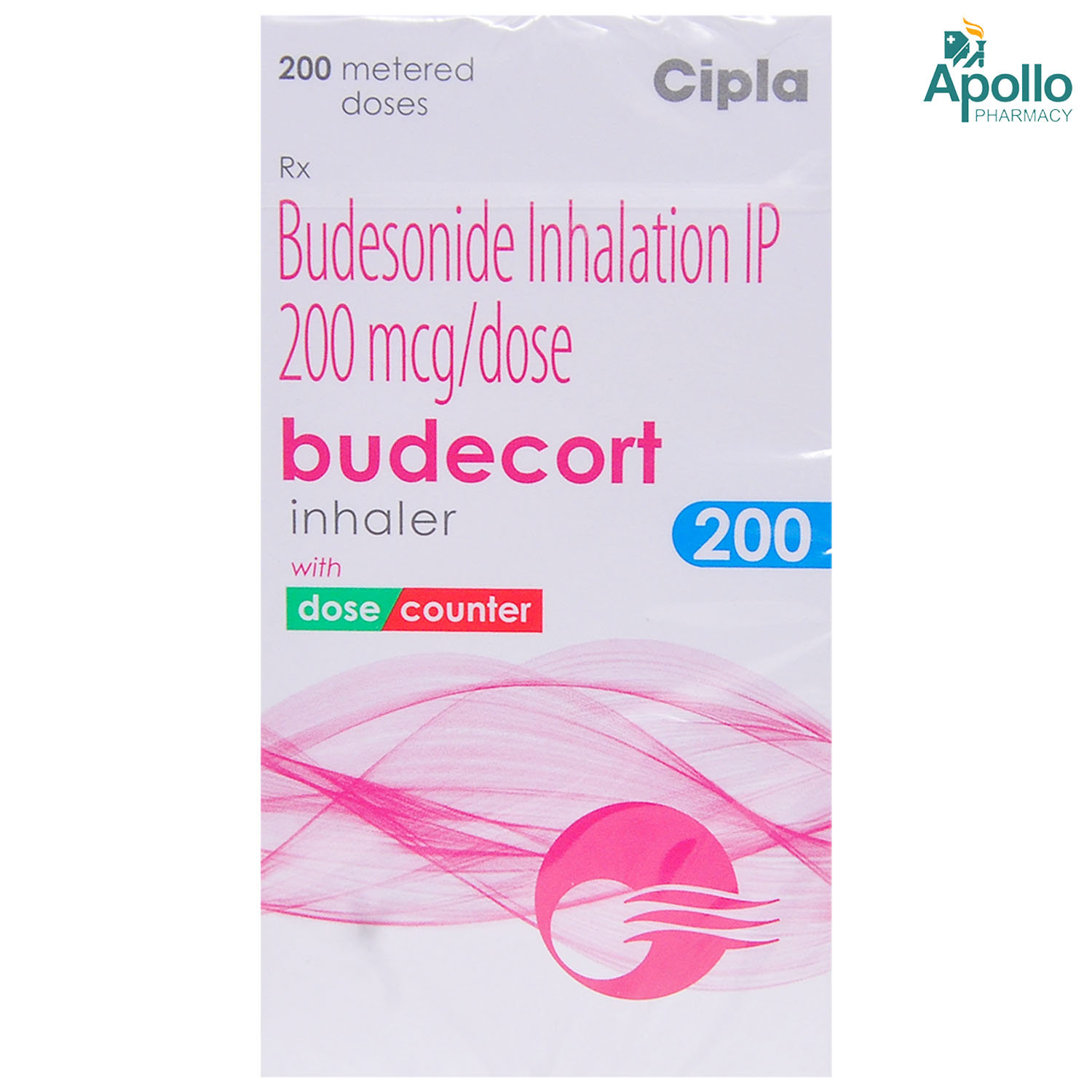Derinide 200 Inhaler 1's
MRP ₹426
(Inclusive of all Taxes)
₹63.9 Cashback (15%)
Provide Delivery Location
Online payment accepted
 Prescription drug
Prescription drugWhats That
Composition :
Manufacturer/Marketer :
Consume Type :
Expires on or after :
Return Policy :
About Derinide 200 Inhaler
Derinide 200 Inhaler belongs to the class of medicines called 'glucocorticosteroids' used to relieve symptoms of asthma and COPD (Chronic Obstructive Pulmonary Disease). Asthma is a chronic (long-term) respiratory condition in which airways narrow, swell, and produce extra mucus, leading to difficulty breathing. COPD is a group of lung diseases that causes obstructed airflow from the lungs.
Derinide 200 Inhaler contains ‘Budesonide’. It works by blocking the making of certain chemical messengers that are involved in allergic and non-allergic-mediated inflammation. Thereby, Derinide 200 Inhaler helps treat inflammatory diseases. Derinide 200 Inhaler decreases inflammation and irritation in the airways and makes breathing easier. Thus, it provides relief from the symptoms of asthma and COPD.
Your doctor will decide the dose and duration based on your medical condition. In some cases, Derinide 200 Inhaler may cause certain common side effects like indigestion, headache, abdominal pain, nausea, bloating, constipation, gas, vomiting, stuffy nose, tiredness/weakness, and sore throat. These side effects generally do not require medical attention and may fade away with time. However, you are advised to talk to your doctor if you experience any of the side effects persistently.
Consult your doctor before using Derinide 200 Inhaler if you are pregnant or breastfeeding. Generally, Derinide 200 Inhaler does not alter your ability to drive, but in some cases, it may cause dizziness, so drive only if you are alert. Derinide 200 Inhaler is recommended for children only with a doctor's advice. The interaction of Derinide 200 Inhaler with alcohol is unknown, therefore consult a doctor if you have any concerns. Keep your doctor informed about your health condition and medications to rule out any interactions.
Uses of Derinide 200 Inhaler
Directions for Use
Key Benefits
Derinide 200 Inhaler eases breathing by reducing swelling and irritation in the airways. It is used to treat various respiratory diseases like allergic rhinitis (allergy that causes itchy, watery eyes and sneezing), COPD (Chronic Obstructive Pulmonary Disease, a lung disease that blocks airflow and causes difficulty breathing), chest tightness, wheezing and coughing caused by asthma.
Storage
- Inform your doctor about the nausea and discuss possible alternatives to the medication or adjustments to the dosage.
- Divide your daily food intake into smaller, more frequent meals to reduce nausea.
- Opt for bland, easily digestible foods like crackers, toast, plain rice, bananas, and applesauce.
- Avoid certain foods that can trigger nausea, such as fatty, greasy, spicy, and smelly foods.
- Drink plenty of fluids, such as water, clear broth, or electrolyte-rich beverages like coconut water or sports drinks.
- Use ginger (tea, ale, or candies) to help relieve nausea.
- Get adequate rest and also avoid strenuous activities that can worsen nausea.
- Talk to your doctor about taking anti-nausea medication if your nausea is severe.
- Record when your nausea occurs, what triggers it, and what provides relief to help you identify patterns and manage your symptoms more effectively.
- Drink water or other clear fluids.
- To prevent worsening of pain, limit intake of tea, coffee, or alcohol.
- Include bland foods like rice, toast, crackers, and rice in your diet.
- Avoid lying down immediately after eating as it may cause indigestion or heartburn.
- Avoid acidic and spicy food as it may cause indigestion.
- Hydrate your body: Drink enough water to prevent dehydration and headaches.
- Calm Your Mind: Deep breathing and meditation can help you relax and relieve stress.
- Rest and Recharge: Sleep for 7-8 hours to reduce headache triggers.
- Take rest: lie down in a quiet, dark environment.
- Cold or warm compresses can help reduce tension.
- Stay Upright: Maintain good posture to keep symptoms from getting worse.
- To treat headaches naturally, try acupuncture or massage therapy.
- Over-the-counter pain relievers include acetaminophen and ibuprofen.
- Prescription Assistance: Speak with your doctor about more substantial drug alternatives.
- Severe Headaches: Seek emergency medical assistance for sudden, severe headaches.
- Frequent Headaches: If you get reoccurring headaches, consult your doctor.
- Headaches with Symptoms: Seek medical attention if your headaches include fever, disorientation, or weakness.
- Gently massage the affected area using your hands or a massager.
- Light exercises such as walking or climbing stairs may help the muscles return to normal.
- Apply heat/ice to the affected area.
- Drink electrolyte-rich fluids.
- Wear compression garments like stockings, sleeves, or gloves to apply pressure and help stop fluid from building up, especially after the swelling goes down.
- Move around and do exercises to help the fluid circulate, especially in swollen limbs. Ask your doctor for specific exercises.
- Raise the swollen area above your heart level several times a day, even while sleeping, to help reduce swelling.
- Gently massage the swollen area with firm but not painful pressure.
- Keep the swollen area clean and moisturized to prevent injury and infection.
- Reduce salt intake to help prevent fluid from building up and worsening the swelling, as advised by a doctor.
- If the swelling does not get better after a few days of home treatment or worsens, consult your doctor right away.
- Keep your skin clean by gently washing your face two times daily and after sweating. Choose a mild and non-abrasive cleanser.
- Use gentle alcohol-free skin care products. Avoid products that might irritate your skin such as exfoliants, astringents and toners.
- Acne may also occur due to oil in the hair. Thus, if you have oily hair, shampoo more frequently than you do now and keep your hair away from face.
- Keep your hands off your face as touching face throughout the day might worsen acne. Also, do not pick, squeeze or pop acne as it will prolong the healing process and increase the risk of dark spots and scarring.
- Avoid tanning by applying a broad spectrum sunscreen and wearing sun-protective clothing when outdoors.
Drug Warnings
Do not use Derinide 200 Inhaler without a doctor's advice if you are allergic to any of the contents or if you have severe liver disease. Inform your doctor if you have/had tuberculosis, infection, high blood pressure, diabetes, osteoporosis, peptic ulcers, glaucoma, cataracts, weak immune system, eczema, kidney or liver problems; if you have been treated with stronger cortisone preparation earlier. Consult your doctor before using Derinide 200 Inhaler if you are pregnant or breastfeeding. Generally, Derinide 200 Inhaler does not alter your ability to drive, but in some cases, it may cause dizziness, so drive only if you are alert. Derinide 200 Inhaler is recommended for use in children only with a doctor's advice. Consult your doctor if you experience visual disturbances or blurred vision.
Drug-Drug Interactions
Drug-Drug Interactions
Login/Sign Up
Using mifepristone together with Derinide 200 Inhaler may significantly reduce the effects of Derinide 200 Inhaler.
How to manage the interaction:
Taking Derinide 200 Inhaler with Mifepristone is not recommended as it can cause an interaction, but it can be taken if prescribed by the doctor. Do not stop using any medications without talking to a doctor.
Coadministration of Derinide 200 Inhaler and Ribociclib may increase the absorption of the medication from Derinide 200 Inhaler into the blood stream.
How to manage the interaction:
Taking Ribociclib with Derinide 200 Inhaler can cause an interaction, consult a doctor before taking it. Consult a doctor if experience swelling, weight gain, high blood pressure, high blood glucose, muscle weakness, depression, acne, thinning skin, stretch marks, easy bruising, bone density loss, cataracts, menstrual irregularities, excessive growth of facial or body hair, and abnormal distribution of body fat, especially in the face, neck, back, and waist. Do not stop using any medications without talking to a doctor.
When Derinide 200 Inhaler is used with teriflunomide, the risk of severe infections increases.
How to manage the interaction:
Co-administration of Derinide 200 Inhaler along with teriflunomide can lead to an interaction, it can be taken if recommended by a doctor. However, if you develop a fever, chills, diarrhea, sore throat, muscular pains, shortness of breath, blood in sputum, weight loss, red or irritated skin, body sores, or discomfort or burning during urination, consult a doctor as soon as possible. Do not discontinue any medications without consulting a doctor.
Taking Derinide 200 Inhaler with Vigabatrin, especially for a prolonged period of time, may raise the chance of significant adverse effects (loss of vision).
How to manage the interaction:
Co-administration of Derinide 200 Inhaler along with Vigabatrin can lead to an interaction, it can be taken if recommended by a doctor. Regular eye check ups are advised. Do not discontinue any medications without consulting a doctor.
When Derinide 200 Inhaler is taken with Cobicistat, may considerably enhance Derinide 200 Inhaler absorption into the bloodstream which may lead to side effects.
How to manage the interaction:
Co-administration of Derinide 200 Inhaler along with cobicistat can lead to an interaction, it can be taken if recommended by a doctor. However, if you experience swelling, weight gain, high blood pressure, high blood glucose, muscle weakness, depression, acne, thinning skin, stretch marks, easy bruising, bone density loss, vision problems, menstrual irregularities, excessive growth of facial or body hair, and abnormal distribution of body fat, especially in the face, neck, back, and waist, infections, a severe asthma attack, consult the doctor immediately. Do not stop using any medications without talking to a doctor.
Coadministration of itraconazole and Derinide 200 Inhaler may significantly increase the blood levels of Derinide 200 Inhaler.
How to manage the interaction:
Despite the possibility of an interaction, Derinide 200 Inhaler and itraconazole can be used if a doctor prescribes them. Consult a doctor if have high blood pressure, high blood sugar, muscular weakness, depression, acne, stretch marks, easy bruising, loss of bone density, cataracts, swelling of legs or hands, irregular menstruation, or excessive development of hair on face or body development of hair. Never stop taking any medications without talking to a doctor.
Using baricitinib together with Derinide 200 Inhaler may increase the risk of serious infections.
How to manage the interaction:
Taking Derinide 200 Inhaler along with baricitinib can lead to an interaction, it can be taken if recommended by a doctor. If you experience fever, chills, diarrhea, sore throat, muscular pains, shortness of breath, blood in sputum, weight loss, red or irritated skin, body sores, and discomfort or burning while urinating, severe stomach pain, nausea, or vomiting, consult a doctor. Do not discontinue any medication without consulting a doctor.
When Derinide 200 Inhaler is used with fingolimod, the risk of severe infections increases.
How to manage the interaction:
Co-administration of Derinide 200 Inhaler along with fingolimod can lead to an interaction, it can be taken if recommended by a doctor. However, if you develop a fever, chills, diarrhea, sore throat, muscular pains, shortness of breath, blood in sputum, weight loss, red or irritated skin, body sores, or discomfort or burning during urination, consult the doctor as soon as possible. Do not discontinue any medications without consulting a doctor.
When Derinide 200 Inhaler is taken with Idelalisib, may considerably enhance Derinide 200 Inhaler absorption into the bloodstream which may lead to side effects.
How to manage the interaction:
Co-administration of Derinide 200 Inhaler along with Idelalisib can lead to an interaction, it can be taken if recommended by a doctor. However, if you experience swelling, weight gain, high blood pressure, high blood glucose, muscle weakness, depression, acne, thinning skin, stretch marks, easy bruising, bone density loss, vision problems, menstrual irregularities, excessive growth of facial or body hair, and abnormal distribution of body fat, especially in the face, neck, back, and waist, infections, a severe asthma attack, consult the doctor immediately. Do not stop using any medications without talking to a doctor.
When Derinide 200 Inhaler is taken with Nefazodone, may considerably enhance Derinide 200 Inhaler absorption into the bloodstream which may lead to side effects.
How to manage the interaction:
Co-administration of Derinide 200 Inhaler along with Nefazodone can lead to an interaction, it can be taken if recommended by a doctor. However, if you experience swelling, weight gain, high blood pressure, high blood glucose, muscle weakness, depression, acne, thinning skin, stretch marks, easy bruising, bone density loss, vision problems, menstrual irregularities, excessive growth of facial or body hair, and abnormal distribution of body fat, especially in the face, neck, back, and waist, infections, a severe asthma attack, consult the doctor immediately. Do not stop using any medications without talking to a doctor.
Drug-Food Interactions
Drug-Food Interactions
Login/Sign Up
Diet & Lifestyle Advise
- Eat a healthy diet and exercise regularly to strengthen your breathing muscles and boost your immune system.
- Avoid foods such as cabbage, beans, garlic, onions, shrimp, pickled food, dried fruits, fried foods, carbonated drinks, wine, and bottled lemon and lime juice as it may worsen asthma symptoms.
- Know your triggers like allergens, such as pollen, dust, and food items that make your asthma severe.
- Do meditation, deep breathing, regular exercise and try progressive muscle relaxation techniques to get relief from stress and reduce the risk of an asthma attack.
- Quit smoking as it may reduce the effectiveness of Derinide 200 Inhaler and irritate the lungs worsening breathing problems.
- Learning breathing exercises will help you move more air in and out of your lungs.
Side Effects of Derinide 200 Inhaler
- Indigestion
- Headache
- Abdominal pain
- Nausea
- Bloating
- Constipation
- Gas
- Vomiting
- Stuffy nosee
- Weakness/tiredness
- Sore throat
Habit Forming
Therapeutic Class
All Substitutes & Brand Comparisons
RX
Out of StockNosthma Bude 200 Inhaler 120 MDI
Precept Pharma
₹211
(₹1.58/ 1MDI)
17% CHEAPERRX
Out of StockPneumabud 200 Inhaler CFC Free
₹366
(₹1.65/ 1MDI)
14% CHEAPERRX
Budate 200 Transhaler
Lupin Ltd
₹426
(₹1.87/ 1MDI)
2% CHEAPER
Author Details
We provide you with authentic, trustworthy and relevant information
Drug-Diseases Interactions
Drug-Diseases Interactions
Login/Sign Up
FAQs
Drug-Drug Interactions Checker List
- DIGOXIN
- KETOCONAZOLE
- ITRACONAZOLE
- CLARITHROMYCIN
- CARBAMAZEPINE
- RIFAMPICIN
- CIMETIDINE
- RITONAVIR
- COBICISTAT
Special Advise
- Derinide 200 Inhaler might affect certain test results. Inform the person doing the tests that you are using Derinide 200 Inhaler.
- If you are due to undergo any surgery or if you need to be vaccinated, inform your doctor that you are using Derinide 200 Inhaler.
Disease/Condition Glossary
Asthma: It is a chronic (long-term) respiratory condition in which airways narrow, swell, and produce extra mucus leading to difficulty in breathing. The symptoms of asthma include wheezing (whistling sound while breathing), shortness of breath, chest tightness and cough, especially at night.
Chronic obstructive pulmonary disease (COPD): It is a group of lung diseases with emphysema (shortness of breath) and chronic bronchitis (inflammation of the lining of bronchial tubes). The major cause of COPD is smoking tobacco. Also, long-term exposure to fumes and chemicals may lead to COPD. The symptoms include chronic cough, shortness of breath or wheezing (whistle sound while breathing).

Have a query?
Alcohol
Safe if prescribed
It is advisable to avoid or limit the intake of alcohol while you use Derinide 200 Inhaler as it may cause increased dizziness.
Pregnancy
Consult your doctor
Please consult your doctor before using Derinide 200 Inhaler if you are pregnant. Your doctor will prescribe only if the benefits outweigh the risks.
Breast Feeding
Consult your doctor
Please consult your doctor before using Derinide 200 Inhaler if you are breastfeeding. Your doctor will decide if Derinide 200 Inhaler can be used by breastfeeding mothers or not.
Driving
Safe if prescribed
Generally, Derinide 200 Inhaler does not alter your ability to drive, but in some cases, it may cause dizziness, so drive only if you are alert.
Liver
Consult your doctor
Please consult your doctor before using Derinide 200 Inhaler if you have a liver impairment or any concerns regarding this.
Kidney
Consult your doctor
Please consult your doctor before using Derinide 200 Inhaler if you have kidney impairment or any concerns regarding this.
Children
Safe if prescribed
Derinide 200 Inhaler is recommended for children below 12 years only when prescribed by a doctor.


